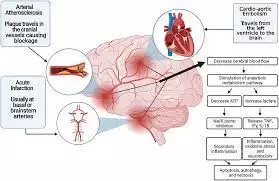- Home
- Medical news & Guidelines
- Anesthesiology
- Cardiology and CTVS
- Critical Care
- Dentistry
- Dermatology
- Diabetes and Endocrinology
- ENT
- Gastroenterology
- Medicine
- Nephrology
- Neurology
- Obstretics-Gynaecology
- Oncology
- Ophthalmology
- Orthopaedics
- Pediatrics-Neonatology
- Psychiatry
- Pulmonology
- Radiology
- Surgery
- Urology
- Laboratory Medicine
- Diet
- Nursing
- Paramedical
- Physiotherapy
- Health news
- Fact Check
- Bone Health Fact Check
- Brain Health Fact Check
- Cancer Related Fact Check
- Child Care Fact Check
- Dental and oral health fact check
- Diabetes and metabolic health fact check
- Diet and Nutrition Fact Check
- Eye and ENT Care Fact Check
- Fitness fact check
- Gut health fact check
- Heart health fact check
- Kidney health fact check
- Medical education fact check
- Men's health fact check
- Respiratory fact check
- Skin and hair care fact check
- Vaccine and Immunization fact check
- Women's health fact check
- AYUSH
- State News
- Andaman and Nicobar Islands
- Andhra Pradesh
- Arunachal Pradesh
- Assam
- Bihar
- Chandigarh
- Chattisgarh
- Dadra and Nagar Haveli
- Daman and Diu
- Delhi
- Goa
- Gujarat
- Haryana
- Himachal Pradesh
- Jammu & Kashmir
- Jharkhand
- Karnataka
- Kerala
- Ladakh
- Lakshadweep
- Madhya Pradesh
- Maharashtra
- Manipur
- Meghalaya
- Mizoram
- Nagaland
- Odisha
- Puducherry
- Punjab
- Rajasthan
- Sikkim
- Tamil Nadu
- Telangana
- Tripura
- Uttar Pradesh
- Uttrakhand
- West Bengal
- Medical Education
- Industry
Early Statin initiation fails to reduce risk of ischemic stroke within 90 days due to atherosclerosis: Study

Early Statin initiation within 72 hours fails to reduce risk of stroke within 90 days in patients with acute cerebral ischemia from atherosclerosis suggests a new study published in the JAMA.
Comparisons are limited for immediate-intensive and delayed-intensive statin for secondary stroke prevention and neuroprotection in patients with acute mild ischemic stroke or transient ischemic attack (TIA) from atherosclerosis. A study was done to estimate whether immediate-intensive statin therapy is safe and can lower the risk of recurrent stroke compared with delayed-intensive statin in patients with acute mild ischemic stroke or high-risk TIA from atherosclerosis. The Intensive Statin and Antiplatelet Therapy for High-Risk Intracranial or Extracranial Atherosclerosis (INSPIRES) trial, a double-blind, placebo-controlled, 2 × 2 factorial, randomized clinical trial enrolled patients from September 2018 to October 2022. The trial was conducted at 222 hospitals in China. Patients aged 35 to 80 years with mild ischemic stroke or high-risk TIA of presumed atherosclerosis within 72 hours of symptom onset were assessed. Patients were randomly assigned to receive immediate-intensive atorvastatin (80 mg daily on days 1-21; 40 mg daily on days 22-90) or 3-day delayed treatment (placebo for days 1-3, followed by placebo and atorvastatin, 40 mg daily on days 4-21, and then atorvastatin, 40 mg daily on days 22-90). The primary efficacy outcome was new stroke within 90 days, and a secondary efficacy outcome was poor functional outcome.
Moderate to severe bleeding was the primary safety outcome. Results: A total of 11 431 patients were assessed for eligibility, and 6100 patients (median [IQR] age, 65 [57-71] years; 3915 men [64.2%]) were enrolled, with 3050 assigned to each treatment group. Within 90 days, new stroke occurred in 245 patients (8.1%) in the immediate-intensive statin group and 256 patients (8.4%) in the delayed group (hazard ratio, 0.95; 95% CI, 0.80-1.13). Poor functional outcome occurred in 299 patients (9.8%) and 348 patients (11.4%) in the immediate-intensive and delayed-intensive statin groups, respectively (odds ratio, 0.83; 95% CI, 0.71-0.98). Moderate to severe bleeding occurred in 23 of 3050 patients (0.8%) and 17 of 3050 patients (0.6%), in the immediate-intensive and delayed-intensive statin groups, respectively. Immediate-intensive statin initiated within 72 hours did not reduce the risk of stroke within 90 days and may be associated with improved functional outcomes without significant difference in moderate to severe bleeding, compared with 3-day delayed-intensive statin in Chinese patients with acute mild ischemic stroke or TIA from atherosclerosis.
Reference:
Gao Y, Jiang L, Pan Y, et al. Immediate- or Delayed-Intensive Statin in Acute Cerebral Ischemia: The INSPIRES Randomized Clinical Trial. JAMA Neurol. Published online May 28, 2024. doi:10.1001/jamaneurol.2024.1433
Dr. Shravani Dali has completed her BDS from Pravara institute of medical sciences, loni. Following which she extensively worked in the healthcare sector for 2+ years. She has been actively involved in writing blogs in field of health and wellness. Currently she is pursuing her Masters of public health-health administration from Tata institute of social sciences. She can be contacted at editorial@medicaldialogues.in.
Dr Kamal Kant Kohli-MBBS, DTCD- a chest specialist with more than 30 years of practice and a flair for writing clinical articles, Dr Kamal Kant Kohli joined Medical Dialogues as a Chief Editor of Medical News. Besides writing articles, as an editor, he proofreads and verifies all the medical content published on Medical Dialogues including those coming from journals, studies,medical conferences,guidelines etc. Email: drkohli@medicaldialogues.in. Contact no. 011-43720751


